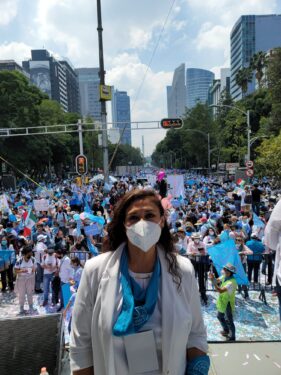PROSPECT HEIGHTS — Mayra Rodríguez got a close-up view of the devastating physical and emotional effects of abortion — not because she had one herself, but because she used to be the manager of a Planned Parenthood clinic.
The former pro-abortion advocate, who was named Planned Parenthood’s Employee of the Year as recently as 2016, has experienced a 180-degree turnaround and is now a leading voice in the pro-life movement in the U.S.
The Mexican-born Rodríguez hosts a weekly show, “A Shout to Heaven,” on Facebook Live and is a public speaker who has carried her message to young women in schools in several countries, both in-person and via Zoom. She is also a member of Democrats for Life. Earlier this month, she was one of the speakers at the “March for Women and Life” rally in Mexico City, an event that drew 300,000 participants.

Her mission now: To convince women that abortion isn’t the answer.
In terms of Hispanic Catholics, the numbers appear to be on her side of the argument. According to a 2019 study by Public Religion Research Institute, 52% of Hispanic Catholics believe abortion should be illegal and 41% say it should remain legal.
Her message is particularly timely now — with the U.S. Supreme Court preparing to hear arguments on the constitutionality of laws in Texas and Mississippi that severely restrict women’s access to abortion. On Friday, the court refused to block the Texas law from being enforced but granted an expedited review of the case, to take place Nov. 1.
“The sales pitch by the abortion industry is that it’s a 15-minute surgery. You get it over and done with, and then you get on with your life. They don’t talk about the dangerous consequences,” said Rodríguez, a Catholic who lives in Phoenix.
The possible consequences include excessive bleeding, and the perforation, or even shutdown of organs, she said. “There’s also depression. The depression, the anxiety, and the feelings of guilt stay with you for years. All those women who think abortion is a quick fix find out it’s not.”
Consent forms at health clinics do list all of the possible things that could go wrong, but many women sign the papers without reading them, she said; unless women ask questions, it’s not discussed.
Rodríguez spent 17 years working in facilities run by Planned Parenthood in Arizona. But it was her last assignment that changed her life, she said.
She had always worked in and managed facilities where abortions were not performed. But in 2017, she was asked to manage one of the largest abortion clinics in Arizona.
She said she saw and heard disturbing things — patients suffering bad outcomes, the falsifying of medical records, and, in one case, a doctor asking a worker to look for a baby’s body part in the trash. When she reported these incidents to her superiors, she was fired.
Her Catholic faith got her through her struggles. She used to feel a sense of shame going to church because one of the parishioners was a woman who prayed outside her clinic. When Rodríguez lost her job, the woman was one of the first people to reach out to her and offer help.
Rodríguez sued Planned Parenthood Arizona on the grounds of wrongful termination and in 2019 won her case. She was awarded $3 million.
At the time the verdict was announced, Planned Parenthood Arizona released a statement disputing Rodríguez’s claims. Inspections by governmental agencies found that her claims “were not substantiated by any of the evaluations of our staff or facilities,” a spokesperson said.
Meanwhile, Rodríguez had found a new direction, transforming from whistleblower to pro-life speaker. “I think we’re making a difference,” she says now. “I strongly believe that the testimony of former abortion workers, and former abortion victims, really makes a difference.”
She wants her message to be heard by minority women and immigrants, particularly Hispanic females.
She noted that New York and California — two states with high abortion rates — also have large numbers of residents in their cities who are black and Hispanic. “And migrants from all over the world are the ones with the highest abortion rates,” she said, adding that there are many abortion clinics located in minority communities.
“Women have to hear the truth behind abortion,” Rodríguez said, “and what really goes on behind this abortion industry.”
